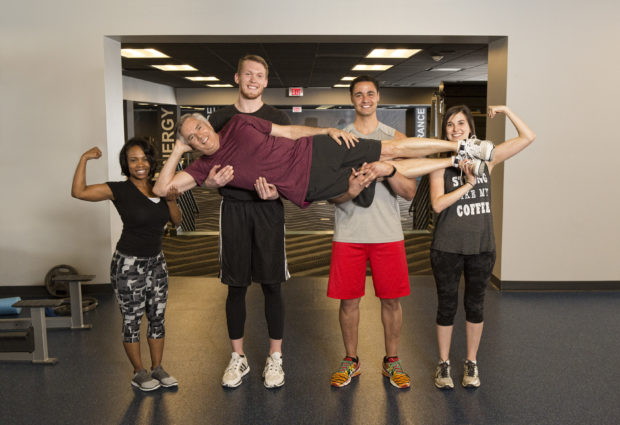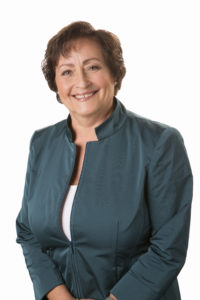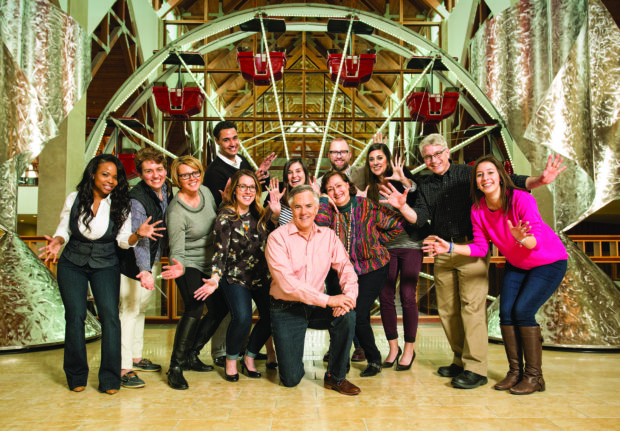Joan Ravanelli-Miller wasn’t always as happy to work at Acuity Insurance as she is today.
In fact, the general counsel and vice president of Human Resources remembers a time when morale was low at the Sheboygan, Wisc.-based mutual insurer. So does Ben Salzmann, the current chief executive officer, who worked as the vice president of IT during the dark days of the company, when “random acts of hatefulness” and arbitrary temper tantrums had employees wondering who the predecessor CEO would fire next for reasons as slight as ordering the wrong entrée at a restaurant on a sales trip.
Executive Summary
Ben Salzmann, the CEO of Acuity Insurance, explains that creating a culture where employees feel valued and a fun-loving company that they don’t want to leave starts with having fierce respect for each individual you hire—”and you do that by genuinely looking at what you would have wanted in their place and answering it honestly.” Here, Salzmann and Acuity’s VP of HR Joan Ravanelli-Miller list talent management practices that start with basic monetary and heath care needs and include fulfilling social and self-actualization needs of Maslow’s hierarchy, with benefits ranging from unlimited sick leave to empowering individuals to develop strategic initiatives.“You couldn’t have plants at your desk…You couldn’t back into a parking space. You had to pull your car in front forward, and if you didn’t, you got written up. It got down to that level of scrutiny,” Ravanelli-Miller remembered, recalling the time from 1989 through 1995 when she was general counsel. “We had a 27.5 percent turnover rate, which meant every three years we essentially had a completely new company.”
But after Ravanelli-Miller left Acuity to pursue a degree in clinical psychology and to work as a psychologist, she kept an eye on her former employer, which started racking up workplace honors after Salzmann became CEO on Jan. 25, 1999.
“I was always stalking Acuity, [and] I decided this company couldn’t be that good. I figured they had a great public relations firm with all this ‘great place to work’ thing. Remember, my first training was as an attorney. So, I am naturally skeptical,” Ravanelli-Miller said. But when Salzmann asked her to come in to work on some one-off projects, meeting with him and groups of employees, she got to experience it firsthand: “The culture is as good as they say it is, which I found to be really unbelievable.”
By the time Ravanelli-Miller rejoined the company in 2013, Acuity’s voluntary turnover rate was plummeting down to 2 percent from that dreaded 27.5, and the company was ascending workplace rankings faster than employees could scale the company’s on-site rock-climbing wall. And by 2016, the mutual insurer ranked as No. 2—not just among insurance companies but all types of companies—right behind Google on the Fortune “100 Best Companies to Work For” list.
Today, with an average review rating of 4.8 out of 5, Acuity ranks as the best property/casualty insurer in the 1,001-5,000 employee size category on Glassdoor, with the most negative comments about the company saying things like: “The free onsite workout facility ran out of towels one day,” and “We can only ride the charity Ferris wheel on Thursday,” or “All the free chocolate they give out is going to my waistline.” (Acuity is also the only P/C insurer on Glassdoor’s 2020 Best Places to Work list for large companies of all types, ranked at No. 97.)

Salzmann was animated when he talked about the Ferris wheel, the 45-foot climbing wall, the 27,000-square-foot workout facility and the midday party being set up in the galleria as he spoke to Carrier Management days before the Green Bay Packers took on the Seattle Seahawks in a divisional playoff—complete with free food, beer, wine, prizes and a live band. But there’s a serious reason behind all the fun. “You start out with fierce respect for the individual,” Salzmann said.
The Glassdoor reviews echo the idea. “I feel valued as a person,” they say, with almost the same words repeated in multiple reviews, which also give the insurer high marks for work-life balance and for open communications that include regular lunches with executives and quarterly town halls.
And while Salzmann began his interview with Carrier Management talking about how certain charitable contributions and events aimed at children help attract a generation of young professionals to Acuity (related article, “Starting in the NICU”), Ravanelli-Miller noted that mid-life career changers and former employees are welcomed—and that a workforce evenly distributed across all age groups is a testament to a culture that fits at any age.
“We have had a lot of folks who are willing to change their careers. We’ve had teachers, police officers, security guards who want to be retrained. We are known in the industry for our training programs, for commercial lines, for commercial processors, for our business systems people. We do bring in folks who are not just your typical college graduate but more seasoned individuals,” Ravanelli-Miller said.
In an industry that suffers to attract and retain talent, Acuity hired roughly 1,000 people between 2012 and 2018, according to figures in the last full annual report. The 2018 annual report, titled “Brick by Brick,” not only shows that growth depicted on one of many bar charts constructed from Lego blocks but also depicts executives like Salzmann, Ravanelli-Miller and the entire board using Legos too—and ends with a quiz offering $1,000 to one employee who answers questions about the report’s contents correctly.
Staring at the Lego image of Salzmann next to the quiz, it’s hard not to ask—was he the key to turning the culture around into the fun-loving social place Acuity is today? And how did the culture change help to return a once unprofitable company into one that the Lego graphs of combined ratios show piling up under 100 for every year since 2011?
“The short answer is yes,” said Ravanelli-Miller, replying to the first question. “The longer answer is Ben was here and saw what it was like before he took over—[and] he saw the opportunity to [start with that] fierce respect for the individual” that he talks about. He’s done that as a leader, first, and “then he surrounded himself with executives who were as committed to that. When you do things from the top down, you invigorate people and you bring them along and you educate,” she said.
“He was the catalyst. And now he’s got a whole company of followers, like the Pied Piper, except he’s bringing everyone along to a culture that continues to embrace novelty, innovation, transparency and really, really being able to walk the talk. If you say this is what you do, you darn well better do it,” she said.
Salzman addressed the second question about the culture connection to financial results. “We created it. Twenty years ago we formed this new management team. We had been downgraded from an ‘A+’ to an ‘A.’ Then we were downgraded from an ‘A’ to an ‘A-.’ We lost a third of our sales, which meant that our employees on average were idle a third of their time, which really crushed morale. We ran 116 combined ratio and states were looking at us on terms of being financially weak.”
“At that point we took the approach of, ‘Hey, everybody, we need you. We need your best ideas. We need everything you can do to turn us around.’ And on the one hand that seems impossibly difficult because you’re saying to a whole workforce, ‘We inherited a disaster and we’re going to go all egalitarian, sing kumbaya and trust that we’re all working together and we’re happy that we will become a financial success.’ [But], yes, that’s what we did. It sort of erodes your guts from stomach acid when you’re making that call because as you face challenge, you become less right brain. You become less [of a] participant. You want to take control because you’re in a panic mode, and we did not do that. We encouraged everybody, we embraced everybody. We had everybody work together to get us here.”
“There’s no question that the egg that came first was changing our culture, trusting our employees, and the chicken that hatched was financial strength,” said the leader of the carrier that now has an “A+” rating.
Celebrating Individuals—and Life
“We’re always, always celebrating life,” Salzmann told CM at one point, when asked to tick off some of the unique talent management practices that support the current culture and motivate the workforce. The CEO uses Maslow’s hierarchy of needs, which starts with basic physiological needs and progresses through social needs of love and belonging and up to self-fulfillment, to outline the benefits of working for Acuity. Fun social events and charitable giving initiatives sit right in the middle of the pyramid.
Starting with the basics, Salzmann said that Acuity uses roughly 14 different salary survey companies to make sure that it’s one of the highest-paying organizations and also contributes the equivalent of 10.5 percent of a person’s salary into their 401(k)—even if they don’t contribute. No match required.
 “He’s got a whole company of followers, like the Pied Piper, except he’s bringing everyone along to a culture that continues to embrace novelty, innovation, transparency and really, really being able to walk the talk.”
“He’s got a whole company of followers, like the Pied Piper, except he’s bringing everyone along to a culture that continues to embrace novelty, innovation, transparency and really, really being able to walk the talk.”
Joan Ravanelli-Miller
Employees are also allowed to work from home. “We bought everybody the most advanced notebook, gave them docking stations at home. If weather is bad, we encourage everybody to stay home,” he said.
Moving up to social needs on Maslow’s pyramid, Salzmann described the events, a fitness facility that brings in trainers from a five-star resort to offer aerobics and other workouts, and Ravanelli-Miller listed various clubs, including a motor sports club, a family connections club, a prayer club and a board game club. “We fund those so that they can take bus rides to different venues, get gaming equipment, whatever else—or just go to a bar after they’re done,” Salzmann said, going on to describe a club known as the “first five year club” in more detail.
“To make sure they make social connections and feel welcome, we give two employees—a man and a woman who have been here less than five years—the company credit card and say, ‘Just plan things.’ They might plan where they have several hundred people show up at a local bar, [or] they might plan to go fix homes for the elderly,” or a race to raise money for charity, he said.
Moving on to the highest Maslow tiers, Acuity clues employees in on strategic plans, involves them in decisions about strategies and gives them access to global thought leaders bringing new ideas to help move their own careers forward, Salzmann said. “We fly people in from Barcelona and Paris. We bring people in from Wharton, from Stanford, from Harvard, from Yale, from Columbia. We bring in CEOs of tech startup companies, and we line up half-days” for their presentations to 150 managers. “Then we video them and we invite the entire company to come to lunch and learn…They get to see what each world thought leader had to say about Acuity, about the world and where we need to go to survive and thrive.”
He tells employees: “You are the president and CEO of the rest of your career, of your future. Learn what’s going on. Don’t hear a filtered version from what Acuity does in CliffsNotes.” Listen to these speakers’ messages “so you can influence your own career’s trajectory.” Salzmann said he delivered that particular message in one of his weekly “Ben’s Gossip Line” recordings on the morning of the CM interview, also selling the bonus of free lunch, soda and a cookie to the workforce.
Pictured on our magazine cover, Salzman is center stage at Acuity’s theater-in-the-round, where he and other leaders address the company regularly—designed that way so that even attendees in the back row can easily ask questions. “Every officer presents. We take open mic questions.” During the most recent one, just before Christmas, employees listened to representatives of six different charities and voted on how to distribute a half-a-million dollars across those charities.
Respect, community, empowerment and fun all create an environment that few people want to leave. But some do. Staff size changes are not, in fact, equivalent to the number of new hires.
“The biggest cause for leaving is that the employee’s spouse wants to be a teacher and there isn’t a teaching opening in Sheboygan County but the other side of the state. [Or maybe] an employee’s parents are very ill and they’re moving across the country. Yes, they can work remotely, but remote working is not a panacea, Salzmann said.
“Sometimes people will leave because they’ve never lived outside of Wisconsin and they want to go somewhere else and have a different experience,” Ravanelli-Miller added. “We’ve had people who wanted to strike out and be an entrepreneur [or] just want to try something different, particularly if they’ve started here right out of college. But we also welcome them back,” she said.
They aren’t leaving because they don’t fit into the culture of Acuity, Salzmann confirmed, answering a question about how Acuity determines employees are a good fit when they are first hired. “The biggest thing we have going for us is where they have known Acuity in some form since their birth,” he said, referring to Acuity events geared toward children, as well as charitable donations. “They really understand who we are, and that dramatically reduces turnover,” he said. (In a related exclusive online article, “Starting in the NICU,” Salzmann explains the birth-to-hire relationship.)





















 Acuity Workplace Honors
Acuity Workplace Honors
 Flood Risk Misconceptions Drive Underinsurance: Chubb
Flood Risk Misconceptions Drive Underinsurance: Chubb  What Analysts Are Saying About the 2026 P/C Insurance Market
What Analysts Are Saying About the 2026 P/C Insurance Market  Experts Say It’s Difficult to Tie AI to Layoffs
Experts Say It’s Difficult to Tie AI to Layoffs  Winter Storm Fern to Cost $4B to $6.7B in Insured Losses: KCC, Verisk
Winter Storm Fern to Cost $4B to $6.7B in Insured Losses: KCC, Verisk 










